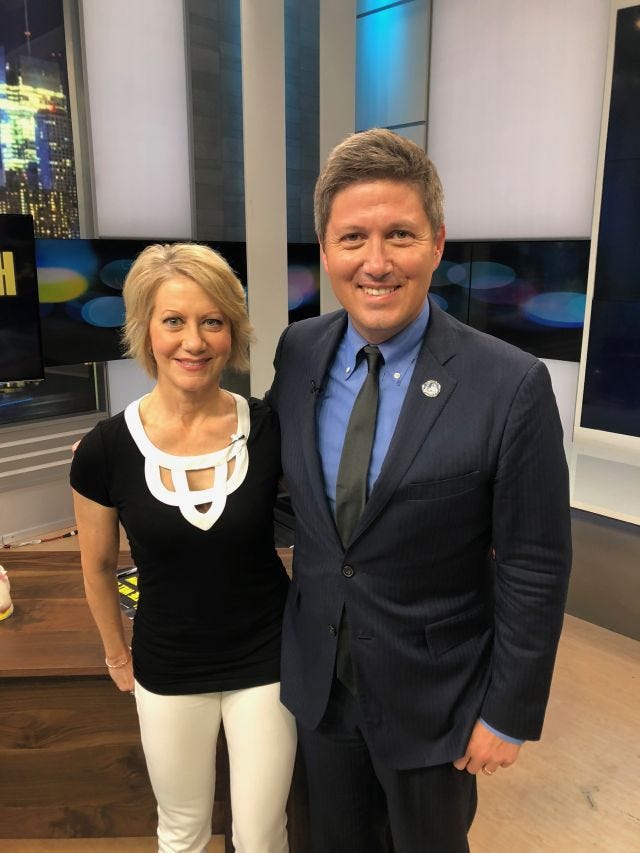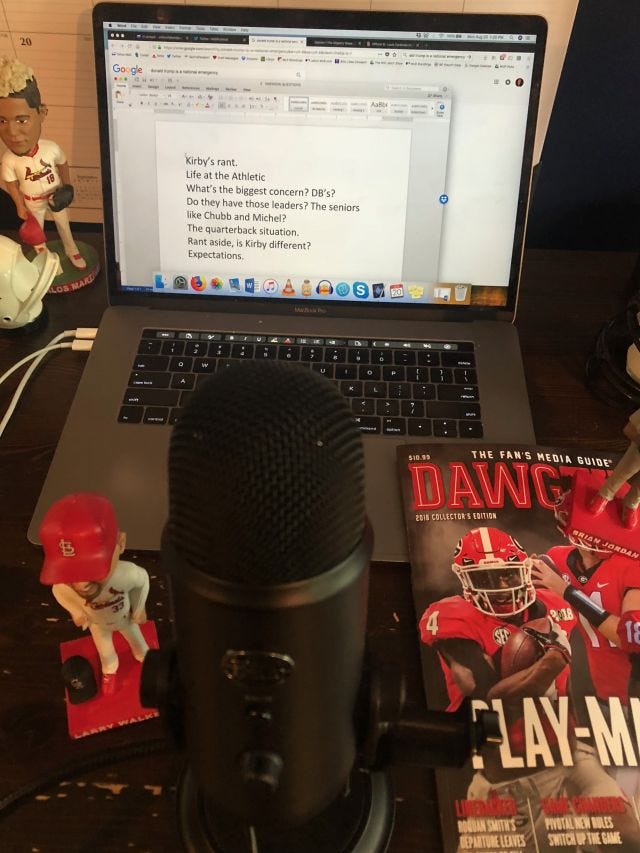Volume 2, Issue 21: Anything Else
Last week, while talking to Hall of Fame NFL reporter Andrea Kremer on my show, I asked her what I thought would be a funny, self-deprecating question. Kremer is famously one of the best sports interviewers of all time, so I asked her, late in the interview:
Leitch: You are known as one of the best interviewers of all time. I am ... not known as that. So can I ask you, now that we're almost done: How am I doing?
Kremer: Honestly?
Leitch: (gulps) (tugs collar) Uh ... sure?
Kremer: You're doing fine. But you need to stop giving me options every time you ask a question. Just go ahead and ask it. I can come up with my own answer.
Anyone who has ever listened to me ask a question on the show or on a podcast surely knows that I do this. When I ask, say, this week's guest Guy Pearce, "has it been a conscious strategy of yours to avoid big tentpole Hollywood movies?" I can't just leave it at that. Instead, as Kremer put it, I have to give him options. Thus, before he has a chance to answer, I add, "I mean, is it a matter of being OK with being a movie star but not too big of a movie star? Nobody wants Tom Cruise's level of fame" and then "or is it just a matter of having your own projects that you want to concentrate?" Neither of these followup questions are adding any additional information, or getting us any closer to an answer. Neither are separate questions either. They are just offshoots of my original question. They are multiple-choice options. Maybe it's one of them. Maybe it's the other. Maybe it's neither. But he doesn't need the options, because he knows the answer because it's his goddamned life. Maybe I should just, you know, let him answer.
I had no idea that I did this. But the minute Kremer pointed it out, I realized that I do this all the time. It's always unnerving when you're 42 years old and you just discover an interviewing tic that a seasoned professional noticed in roughly 30 seconds.

I earned a journalism degree from the University of Illinois in 1997, and I have interviewed thousands of people in my life and career. I have gotten better at it. I remember, in college, interviewing Sean Payton, then an assistant coach at Illinois, and asking him who he was thinking about starting at defensive back next week. (He informed me, politely, that not only was he the quarterbacks coach, but that Illinois had next week off.) As with everything else, you improve at things you more you do them: There is almost nothing in this world you cannot become at least passable at if you wholly commit yourself to it. But I'm still not that great. I'm just muddling through.
I've had some interviews that turned out well. My favorite is probably still Spike Lee, and Michael Vick had some muscle to it, and Sarah Silverman was fun, and wow this Twitter profile from 2009 is pretty crazy now, and if you put me in a room with someone interesting for an hour, I'll find something worthwhile to write about. But that's sort of the thing, right? I'm always thinking about writing first. That's why I went into journalism in the first place: I wanted to write. Reporting wasn't something I disliked, and it was something I was eager to improve at, but it wasn't the reason I decided to do this. I wanted to write, about the world, about myself, about life, about the lunacy of all of it. I wanted to make jokes, I wanted to move people, I wanted to change minds, I wanted to express! But that's not being a journalist. Being a journalist is giving voice to the voiceless, challenging those in power, providing information to a public that deserves the truth. I had no problem with any of those things! Those things are great! But that wasn't the initial goal. That wasn't the primary purpose.
I'm a firm believer in a human being ultimately finding his or her natural water level. Whatever it is you are supposed to do, you will either do it or drift close enough to it that whatever it is you end up doing is at least in the ballpark of who you are as a person, even if it's not what the original plan was. I know that this is not always the case, but I think the world ultimately curves in one's direction. And it has always been my personal strategy. It's why I never worry about clicks, or feedback, or self-promotion, or obsessive use of social media. Maybe caring about those things would help me or maybe they would hurt me, but it doesn't really matter, because to try to excel at those things would be outside of my basic personality. If I tried to be good at them, I'd either be terrible at them or so miserable because I was going against my inherent nature that I wouldn't enjoy any positives that came out of them. So I try not to sweat it. This is one of the nice things about getting older. You grow more comfortable with who are and, more to the point, who you are not. I just do what I do well and what I enjoy, and I do it over and over and over again, and I hope I get to keep doing that until I die. That might sound dark to someone in their early twenties, but to me, it's the definition of personal satisfaction. That's what I was working toward the whole time. Dying at my desk is just fine.
The downside to this -- other than the downside of dying face down in your laptop at your desk -- is that it is difficult to fake things that don't come naturally to you. I can pass as a good reporter if I have to, and I can practice the fundamentals, and I can get the story, but I'll never be inherently gifted at it, the way an Andrea Kremer is, the way that my two successors at Deadspin, A.J. Daulerio and Tommy Craggs, are. (I honestly think Daulerio is the greatest pure reporter I've ever worked with, and Craggs, along with David Wallace-Wells at new York, the greatest editor. Comparing myself to them is doing myself no favors.) I'll get the story if I can, but it has to be told my way, via the route I need to get there. I don't think this makes me special: It makes me stubborn, obnoxious and flawed. But people find their natural water level. I can do a thousand podcasts, and host a few dozen TV shows, and I can try to get better and be entertaining and generally try to justify my worth as a person who's talking at that moment rather than typing. But I'll always be a writer first. Everything else is just trying to hang on.
I'm reminded of something my old friend Matt Ufford told me, about how he'd deciphered something about my conversational style. "It's like you're in a room with a bunch of locked doors, and you go down one path, and that door's locked, that's OK, you'll back up, try another door, nope, that one's locked too. Once you find the right door, though, you just walk right through it. When you're writing, no one sees you try to open all those locked doors. They just see you walk through the unlocked one. But when you're talking, people notice." He didn't mean this as an insult, and I didn't take it as one. He was exactly right. That is exactly how I talk. I had never noticed it before. He told me this years ago. I still do this. I cannot help it. We are who we are.
Here is a numerical breakdown of all the things I wrote this week, in order of what I believe to be their quality. (This is an attempt to have an objective look at the value of my work in a way that I suspect will be difficult to sustain.)
1. The Miracle of Serena Williams, New York. I usually try to be dispassionate and objective and even a little smug in those NY mag columns, but I can't not get excited about Serena Williams.
2. Review: "The Happytime Murders," Paste Magazine. Yikes.
3. Melissa McCarthy Movies, Ranked, Vulture. There are some pretty rough ones, gotta say.
4. It Must Be So Exhausting to Be a Dodgers Fan This Year, MLB.com. That Cardinals series was pretty fun!
5. The Worst Teams in Baseball Can Still Have Hope, MLB.com. Well, maybe not the Royals.
6. The Thirty: The Player on Each Team You Want to See Win the World Series, MLB.com. The Ryan Braun pick is going over well.
7. Judd Apatow Movies, Ranked, Vulture. Updated!
8. Debate Club: Best Video Game Movies, SYFY Wire. There are no good video game movies.
THE WILL LEITCH SHOW

This week's guest on "The Will Leitch Show" was Guy Pearce. Guy Pearce! This was a particularly good show. Watch our show right here on Amazon or on SI TV.
PODCASTS
Grierson & Leitch, "Crazy Rich Asians," "Mile 22," "Juliet, Naked" and "Back to the Future."
Seeing Red, Bernie Miklasz and I noticed that the Cardinals are good again. OH YES THEY ARE GOOD AGAIN.
Waitin' Since Last Saturday, it's getting to be that time! I interviewed The Athletic's Seth Emerson, and then we did a big honkin' preview podcast.
If you have an Amazon Alexa -- and my family doesn't, for obvious reasons -- you can hear a special show Grierson and I are doing weekly solely for the Amazon Alexa. Read about it here. If you have one, will you try it out and see if it works? I have no idea how to work that weird device.
Also, I was on the Extra Hot Great podcast this week, talking about "Better Call Saul" and "Columbo." That is a great podcast.
This is the last weekend before football starts in Athens, so this is the last time things will be normal for a long time. Remember me, and holler back when it's all over.

Have a great weekend, everyone.
Best,
Will

